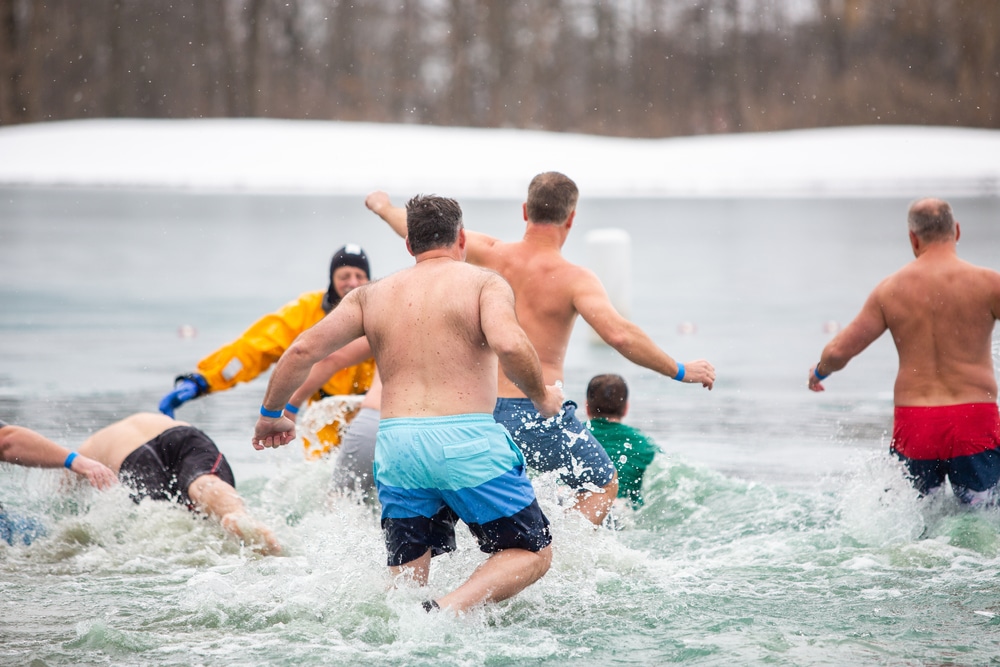Are you ready to take the plunge this winter?

Each winter, many brave souls take a dip in a body of water in what is known as the Polar Plunge, which has some disputed health and fitness benefits.
While some people may trek out to a local lake or pond for a solitary dip in freezing water, others participate in large-scale plunges that serve as charity events, such as raising money for the Special Olympics. Local groups like the Coney Island Polar Bear Club in New York City sponsor these events to bring together veteran and novice polar plungers to experience the chilling fun, raise money for good causes and engage in atypical exercise.
Many long-time winter swimmers claim the activity is a great way to exercise. In fact, TIME Magazine reported Coney Island Polar Club founder Bernarr MacFadden said the endeavor is “a boon to one’s stamina, virility and immunity.” Many who have followed in his footsteps have held a similar belief, but some experts haven’t always been convinced.
So if you’re considering a polar plunge as part of your senior wellness routine this winter – whether for unusual exercise or charity – is the endeavor worthwhile and safe?
What happens to your body?
If you’ve ever taken a dip in cold water, you know it takes your body some time to adjust. However, the effect of stepping into a bath that’s not quite warm enough and jumping into an ocean when temperatures are below freezing are drastically different.
“Many long-time winter swimmers claim the activity is a great way to exercise.”
Many health experts say the body goes into shock when it first meets the water. This is because your blood vessels will begin to tighten to trap heat. As a result, your heart must work harder to get the blood flowing, which also increases your breathing rate.
You’ll start to gasp as you try to catch your breath. Considering the number of people who participate in polar plunges, there’s a good chance you’ll go underwater for some time, meaning you could inhale some saltwater before you’re stable again.
While this reaction lasts only a few minutes, it can be more pronounced in individuals who have pre-existing health conditions, particularly heart problems. Even swimmers who are mere feet from the shore can experience difficulty and need to bow out.
What are the chances of a bad reaction?
Each winter, many people give polar plunging a go for the first time. However, even with all the novice wintertime swimmers, many event coordinators report no incidents.
The Maryland State Police Polar Bear Plungefest, for example, has been going strong for more than a decade but has not experienced any issues, according to NBC News. Additionally, Kelley Schniedwind, a spokeswoman for the event, told the news source that coordinators have rules in place and divers on standby to ensure swimmers are staying safe. Participants are allowed in the water for only five minutes.
With these safeguards in place and most plunges experiencing few or no incidents, you may be ready to go charging into freezing water. Yet, are the health payoffs worth the chill?
Are polar plunges good exercise?
TIME noted that no definitive studies have shown wintertime swimming has health benefits. However, many participants and a few experts believe the benefits are clear. Some experts report skin health and stress benefits, as well as a jolt for mental processes.
 Some experts say polar plunges aren’t an issue if you’re healthy and slowly enter the water.
Some experts say polar plunges aren’t an issue if you’re healthy and slowly enter the water.While noting these benefits, experts emphasize polar plunges are safest for healthy individuals. Before participating as part of your senior fitness routine, you should speak with your physician to ensure your body can handle the cold water.
Veteran wintertime swimmers and health care experts explain it’s best to go slow your first time. The cold shock is inevitable, but by gradually acclimating your body to the water, you can give your system more time to adjust rather than experiencing a sudden shift.
Turning 65 and need help navigating the complexities of Medicare, or maybe you’re an existing beneficiary seeking to maximize their Medicare benefits? We can help. Give us a call at 844-783-2340.

